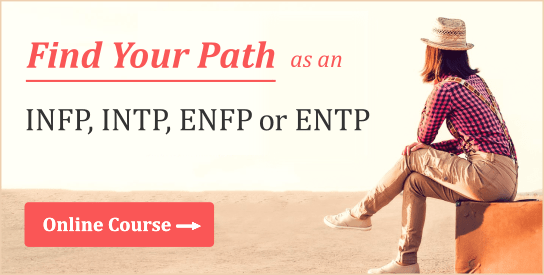The INTP and ENTP types are well viewed as kindred spirits, with both placing high value on things like autonomy, freedom, creativity, and intellectual exploration. Like other NP types, they are holistic thinkers. They gravitate toward historical, religious / spiritual, and speculative philosophies, topics which engender the sense of wonder and mystery they desire. These and other similarities stem from the fact that NTPs use ALL of the same cognitive functions, only in a slightly different order:
Their many commonalities can be make differentiating these types a challenging affair, even in social contexts where E-I differences typically come to the fore. If we were to encounter, for instance, an INTP with respectable social skills along with an ENTP who is not overly gregarious, it could prove difficult to determine their respective types.
The fact that NTPs utilize the same extraverted functions—Extraverted Intuition (Ne) and Extraverted Feeling (Fe)—can make it particularly tricky to distinguish them from without, as both types tend to be inquisitive, congenial, intellectual, and quick-witted. Granted, if an INTP is quite introverted or an ENTP patently extraverted, type differentiation will prove less taxing, despite their functional similarities.
As discussed in my post, “Face” Thyself, research suggests that introverts and extraverts can often be distinguished by facial appearance alone. Facial data, in combination with other non-verbal cues such as posture, mannerisms, and body type, can help us determine the E-I preference for individuals of any personality type.

Understanding the respective ordering of NTPs’ functions is also of considerable importance, allowing us to anticipate key differences in their presentation. Namely, because ENTPs’ dominant function is Ne rather than Ti, they tend to exhibit the following characteristics:
ENTP Traits
- More talkative, socially assertive, and collaborative than INTPs
- Prefer exploring ideas with others rather than via written communication or independent ideation
- Exhibit less inward focus and greater distractibility; may have trouble staying on task / topic
- Display greater versatility and breadth of interests; life seems too short to satisfy their inexhaustible curiosity
Guided and directed by Introverted Thinking (Ti), INTPs are inclined toward the following:
INTP Traits
- Tend to be comparatively less talkative; communicate more slowly, measuredly, and less fluidly; exhibit greater concision in their diction
- Prefer written communication or independent ideation to allow for careful evaluation and precise expression of ideas
- Exhibit greater autonomy and self-direction; slower to solicit others’ help or input; prefer making judgments and decisions independently; routinely seek solitude or tune out the world around them for the sake of undisturbed thought
- Display a more circumscribed set of interests
It is worth noting that these distinctions largely involve differences of degree rather than kind, which seems appropriate in light of functional redundancy of these two types. Personal experience with INTP vs. ENTP types is thus invaluable for developing a sense of their respective presentations and proclivities.
The Inferior Function in INTP-ENTP Differences
One of the more interesting and overlooked factors in type differentiation is the inferior function. The most unconscious of a type’s four functions, the inferior is sometimes described as the repressed or missing function. We should not assume, however, that its unconscious nature renders it any less important or influential than the other three functions. Indeed, as I’ve discussed elsewhere, the inferior function can play a surprisingly potent role in shaping our motivations, interests, identity, and relationships.
Although both of our NTP types have Extraverted Feeling (Fe) and Introverted Sensing (Si) in the bottom half of their function stacks, Fe is the inferior and most unconscious function for INTPs, while Si fulfills this role for ENTPs. To compensate for inferior-function related concerns or deficits, INTPs tend to over-emphasize and idealize certain Fe matters, and ENTPs Si ones.
Introverted Sensing (Si) references the past—its practices, beliefs, traditions, etc.—to inform the present. More specifically, it favors those things which have become deeply familiar and comforting to the individual, commonly engendering a sense of sentimentalism and perhaps, for the ENTP, a sense of awe or mystery when reflecting on the past. ENTPs often exhibit a sort of romanticism toward the ideas or practices of certain historical periods they have come to see as preferable to those of the present. I have on more than one occasion found myself surprised when an otherwise open-minded, forward-thinking ENTP suddenly becomes very impassioned, even dogmatic, about a certain issue which on further discussion proves to be tied to an idealized past.
For instance, in my recent conversation with an ENTP twenty-something about modern dating practices, he confessed his belief that Americans’ approach to love and marriage was probably better 20, even 50, years ago. The fact that he had come to this conclusion so early in life suggested to me that he had, at least on this occasion, sacrificed his dominant function (Ne), which, apart from its Si antagonist, would surely be thrilled by the smorgasbord of options available on the modern dating scene.
I’ve also observed many ENTPs eulogize certain historical periods in connection with their religious heritage. The solution to our modern ills, for such individuals, is not to look forward, but backward. Seen through the sentimental and idealized lens of inferior Si, the past is a idyllic place that we (or more accurately, the ENTP) must remain connected to. Psychologically, this might be viewed as a projection or symbol of ENTPs’ desire to connect with and integrate their inferior Si.
While many INTPs also enjoy reading and studying history, they are typically more dubious toward the prospect of salvation through the resurrection of ancient traditions. The closest INTPs might come, in this respect, is adopting some sort of anarcho-primitivist philosophy with an eye toward undercutting consolidated power structures and augmenting individual freedoms. As highlighted in our books, The INTP and The INTP Quest, the psychospiritual quest for INTPs is largely centered on the reconciliation of Ti and Fe. There are at least two foundational concerns in this quest: one involves people / relationships and the other meaning / purpose.
Despite their status as dominant thinkers, INTPs commonly display a keen interest in studying and/or engaging with people. My INTP uncle, for instance, is a lifelong student of Christianity not to mention religion in general. He follows all the leading theologians and influential players on the modern religious scene, including acquainting himself with their academic backgrounds and how they are all connected. For him, it’s not just the theology that’s interesting, but the lives of the thought leaders themselves. Although rarely engaging with these individuals directly, he envisions himself as a participant in this broader theological community and its ongoing dialogue.
INTPs are also meaning-seekers, or put more negatively, they worry about the absence of meaning in life generally and their lives in particular. Due to the subconscious nature of their feeling function, they may struggle more than other types to experience value in life’s simple pleasures. Their typical response is to seek meaning in the abstract, often through the lens of philosophical, religious, or psychological constructs. They sense that finding the right philosophy or worldview will help them ward off threats of nihilism and meaninglessness.
While it’s possible that I haven’t surveyed a sufficient number of ENTPs, I have never met an ENTP who was deeply plagued by concerns about the futility of life. Granted, not all INTPs overtly struggle, or have reached the point in their lives where they will struggle, with these issues, but for INTP intellectuals, in particular, concerns about meaning / meaninglessness are commonplace. Whether we explain this issue in terms of INTPs’ inferior Fe or ENTPs’ more optimistic disposition, it does appear to be type-related.
INTP vs. ENTP: Concluding Remarks
While additional examples of INTP-ENTP differences could certainly be furnished, I will instead invite readers to consult our type profiles, books and articles for further elaboration. What is most important, with respect to type diagnosis, is not the particular form an inferior-function issue assumes, but the amount of attention, idealization, and fervor devoted to it. Contrary to what one might predict, individuals of all types seem inclined to idealize and grant greater attention to the inferior function than the tertiary and sometimes even the auxiliary function. I suspect this stems from the inferior being experienced as “missing” (e.g., “Something really important or valuable seems to be missing from my life…”) and thus in most desperate need of discovery, development, and integration.
If you observe carefully, you may well be surprised by the amount of time INTPs, despite being T dominants, focus on F concerns and ENTPs, despite leading with N, care about certain traditions, past-times, or other Si matters. This is not to suggest that NTPs will master the inferior function (a monumental task for any type), but both will unwittingly go out of their way to ensure that its needs are met, as doing so is to participate in the process, one which is common to all types—the quest for psychospiritual wholeness.
If you’re an NTP looking to better understand your personality, purpose, and life path, you’ve come to the right place. A.J. Drenth, the founder of this website and fellow INTP, has written extensively about these types, including authoring the best-selling INTP book worldwide.
We’ve also developed an online course, Finding Your Path as an INFP, INTP, ENFP or ENTP, designed to help you better understand your personality, life purpose, career path, and more.

